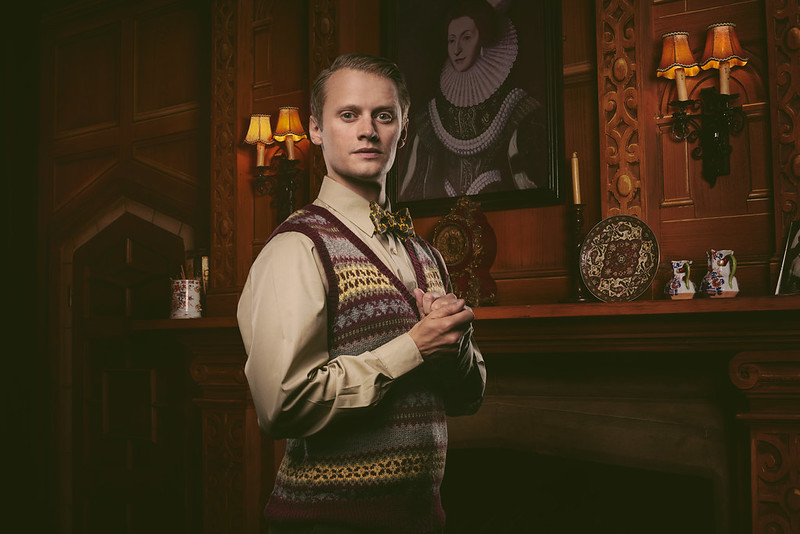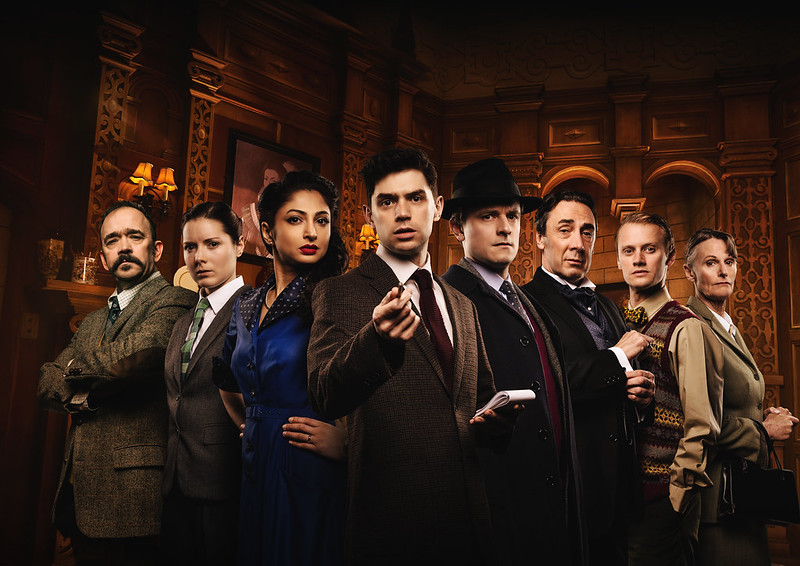A mainstay of the West End and the world’s longest-running play, Agatha Christie’s The Mousetrap has embarked on a nationwide tour to celebrate its 70th anniversary.
While it’s easy to see the appeal of this Cluedo-esque thriller, it’s let down by a tendency towards the farcical and some thin characterisation.
Agatha Christie’s play follows a young husband and wife team, the Ralstons, opening a remote country guesthouse and welcoming a collection of misfits and strangers to stay. As snow piles up outside, the house becomes cut off from the outside world, and a police sergeant arrives to inform them that a killer – on the run from a grisly murder in London – is hiding in their midst.
Directed by Ian Talbot OBE and Denise Silvey, the ensuing murder mystery falls very much on the cosy side of the crime spectrum. It plays more like a comedy for much of it – an odd touch given the murderous subtext and looming spectre of male violence – but despite some hidden depths it feels generally surface-level, and sadly becomes increasingly ridiculous as the action goes on.
The Ralstons, particularly Mollie (ably played in the production I saw by understudy Hollie Sullivan), are the play’s most sympathetic and well-rounded, realistic characters. Sullivan in particular was a charming presence with fantastic depth and emotional range, while husband Giles (Barnaby Jago) was an excellent counter, simultaneously protective of her and threatened by her growing friendship with one of the guests. Their relationship was sweetly played and as the stakes got higher, their growing suspicion of each other was convincing and difficult to watch.
The remaining cast felt somewhat more like ciphers rather than real people, from the aloof Miss Casewell (Amy Spinks) to the lecturing Detective Sergeant Trotter (Michael Ayiotis), who made a rather wooden policeman. Gwyneth Strong was a highlight as the immediately dislikeable, snotty Mrs Boyle, and the other characters’ interactions with her – and catty comments about her – provided lots of laughs.
Unexpected guest Mr Paravicini (Steven Elliot), whose Rolls Royce has overturned in the snow, was another comedic highlight thanks to his sinister comments and obvious glee when poking fun at all the others. The mincing, flamboyant trainee architect Christopher Wren (Shaun McCourt) and amiable retired soldier Major Metcalf (Todd Carty) round out the cast.
The play’s central flaw is its silliness. It has interesting things to say on how little we really know about other people, and people’s ability to get inside others’ heads and shift how they view the world around them. Equally, Mrs Boyle and Miss Casewell’s sharp-tongued clashes over class, gender and politics, and Ralston’s jealousy of Christopher’s affinity with his wife, add an extra edge to the performance. So does the play’s darkest material, skirting around childhood trauma and the repercussions of neglect.
But just as it appears to be getting close to a moment of high drama it shies away and descends suddenly into farce. It’s almost as if the play doesn’t take itself or its message very seriously – which is a shame.

The play’s somewhat thin script was, however, excellently supported by the staging, lighting and sound design. The ornate set was beautifully designed, and the actors interacted with it perfectly in character, from Christopher’s cheeky practical jokes to Mrs Boyle’s fussy movements.
Mike Thacker’s sound design, for Orbital Sound, was integral to the drama and evoking the setting, from the period-appropriate RP on the wireless to the seamless transition from music within the play to playing over the theatre speakers at the interval, as well as the ominous recurring chords of ‘Three Blind Mice’ were another.
Sonic Harrison’s lighting design was also crucial in creating a tense atmosphere and ratcheting up the fear factor, gradually dimming the lights to close in on the characters and play on their suspicion of each other and jumpiness in the big, draughty house. And moments of silence when individual characters are alone onstage, particularly when Sergeant Trotter hunts for clues, are particularly effective at building suspense in the second half.
Tradition has it that the twist ending is kept firmly under wraps, and with Ayiotis’ plea that the audience – now the actors’ ‘partners in crime’ – keep it a secret, all I will say is it was one of the play’s finest moments. It was superbly acted by all involved, an indication of what might have been for the rest of the play.
But this is the theatre equivalent of slipping on a well-worn coat – comfortable, a bit complacent, not really trying to do anything different, and it unfortunately falls a little flat as a result.
The Mousetrap continues at The Lowry until Saturday 13 April, then touring around the UK.
Images credit: Matt Crockett. Used with permission of The Lowry.




